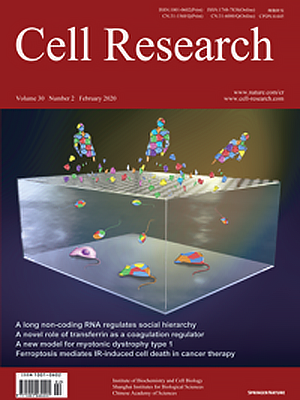
Advanced Search
Submit Manuscript
Advanced Search
Submit Manuscript
Volume 30, No 2, Feb 2020
ISSN: 1001-0602
EISSN: 1748-7838 2018
impact factor 17.848*
(Clarivate Analytics, 2019)
Volume 30 Issue 2, February 2020: 163-178 |
Kai Li 1,2, Jian-lin Wu3, Baifu Qin 1,2, Zongmin Fan 1,2, Qin Tang 1,2, Weisi Lu4, Haipeng Zhang5, Fan Xing6, Manqi Meng 1,2, Shaomin Zou 1,2, Wenxia Wei 1,2, Honglei Chen7, Jian Cai7, Huaiming Wang7, Hui Zhang8, Jiayue Cai 1,2, Ling Fang 9, Xiqing Bian3, Chuangqi Chen 10, Ping Lan 1,2,7, Bart Ghesquière11, Lekun Fang 1,2,7 and Mong-Hong Lee 1,2
1 Guangdong Provincial Key laboratory of Colorectal and Pelvic Floor Disease, The Sixth Affiliated Hospital of Sun Yat-sen University, 510655 Guangzhou, China; 2Guangdong Research Institute of Gastroenterology, The Sixth Affiliated Hospital of Sun Yat-sen University, 510655 Guangzhou, China; 3State Key Laboratory of Quality Research in Chinese Medicine, Macau Institute for Applied Research in Medicine and Health, Macau University of Science and Technology, Macao, China; 4State Key Laboratory of Ophthalmology, Zhongshan Ophthalmic Center, Sun Yat-sen University, Guangzhou, China; 5Department of Pharmacology, School of Medicine, Jinan University, 510632 Guangzhou, China; 6School of Medicine, Sun Yat-sen University, Guangzhou, China; 7Department of Colorectal Surgery, The Sixth Affiliated Hospital of Sun Yat-sen University, 510655 Guangzhou,China; 8Zhongshan School of Medicine, Sun Yat-sen University, 510080 Guangzhou, China; 9Instrumental Analysis & Research Center, Sun Yat-sen University, 510080 Guangzhou, China; 10Department of Colorectal Surgery, The First Affiliated Hospital of Sun Yat-sen University, 510000 Guangzhou, China and 11Metabolomics Core Facility, Center for Cancer Biology, VIB, Leuven, Belgium
https://doi.org/10.1038/s41422-019-0257-1